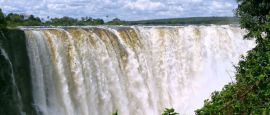Getting around Zimbabwe
Domestic air travel in Zimbabwe is a convenient way to cover long distances, particularly for visitors with limited time or those travelling between major cities and tourist centres. Flights link Harare with destinations such as Victoria Falls and Bulawayo, reducing journey times compared with road travel.
Zimbabwe's national carrier, Air Zimbabwe, operates domestic services, alongside private and regional airlines on selected routes. Victoria Falls International Airport (VFA) and Harare Robert Gabriel Mugabe International Airport (HRE) serve as the main hubs for domestic flights, with modern facilities and straightforward check-in procedures.
Travelling by road is one of the most practical ways to explore Zimbabwe, offering flexibility and access to national parks, rural areas and smaller towns. The country has an extensive road network linking major cities such as Harare, Bulawayo, Victoria Falls, Mutare and Masvingo.
Fuel stations are widely available in cities and along major routes, though travellers should ensure they refuel in advance when heading into remote regions. Road signs are generally clear on main roads, though signage may be limited in rural areas. Travel times can be longer than expected due to road conditions, traffic checks and occasional livestock on roads.
Road quality in Zimbabwe varies considerably. Major highways connecting cities and border crossings are generally paved and in reasonable condition, although potholes can appear, particularly after the rainy season. Secondary roads and rural routes may be uneven, narrow or poorly maintained.
Night driving is not recommended outside urban areas due to poor lighting, wildlife, livestock and occasional road hazards. During the rainy season, from November to March, some roads may become difficult to pass, especially in rural areas.
Zimbabwe's road network consists of primary roads linking major cities and border posts, secondary roads connecting towns and districts, and tertiary roads serving rural communities. Primary roads are usually tarred, while secondary and tertiary roads may be gravel or dirt.
Signage is most reliable on main routes, while GPS navigation can be less accurate in remote areas. Travellers are advised to carry offline maps or seek local advice when driving outside major centres.
Car hire is available in Harare, Victoria Falls and Bulawayo, with both international and local rental companies operating. Many visitors choose to hire a four-wheel-drive vehicle when travelling outside cities or visiting national parks.
Self-driving offers flexibility, but travellers should be confident driving in local conditions. Vehicles are usually rented with basic insurance, and advance booking is recommended, particularly during peak travel periods.
Taxis operate in major cities and tourist centres, though many are not metered. Fares should be agreed in advance. Ride-hailing services (InDrive, Bolt, Vaya) operate in Harare and other large cities.
Visitors may find hotel-arranged taxis reliable, particularly for airport transfers and evening travel.
Cycling is more feasible for short recreational rides or as part of organised tours, particularly in scenic areas such as the eastern highlands.
Long-distance buses and coaches operate between major cities and towns and are widely used by locals. Services link destinations such as Harare, Bulawayo, Victoria Falls and Mutare. Vehicles range from large coaches to smaller minibuses, with comfort levels varying by operator.
Traffic drives on the left-hand side of the road. Speed limits are typically 60 km/h in urban areas, 80 km/h on open roads and up to 120 km/h on highways, unless otherwise indicated. Speed limits are enforced, and police roadblocks are common.
Drink-driving laws are strictly enforced, with a zero-tolerance approach in practice. Seat belts must be worn where fitted, and mobile phone use while driving is prohibited.
Zimbabwe does not have a comprehensive nationwide roadside assistance service. Travellers hiring vehicles should rely on their rental company for breakdown support. In rural areas, basic repairs may be available from local mechanics, though spare parts can be limited.
Carrying emergency supplies such as water, a spare tyre and basic tools is recommended when travelling long distances.
Foreign drivers must carry a valid driving licence from their home country. An international driving permit is recommended and may be requested by police or rental companies. Drivers should also carry vehicle registration documents, insurance papers and personal identification at all times.
Within cities and towns, travel is typically by car, minibus taxi or on foot for short distances. Urban centres such as Harare and Bulawayo have busy road traffic, particularly during peak hours, but distances within city centres are manageable.
Walking is practical in central areas during the day, though visitors should remain aware of their surroundings and avoid walking alone at night in unfamiliar areas.
Zimbabwe has a rail network operated primarily for freight, with limited passenger services. Trains connect some major cities, including Harare and Bulawayo, but services are infrequent and subject to delays.
Do you have any Feedback about this page?
© 2026 Columbus Travel Media Ltd. All rights reserved. No part of this site may be reproduced without our written permission, click here for information on Columbus Content Solutions.




 You know where
You know where